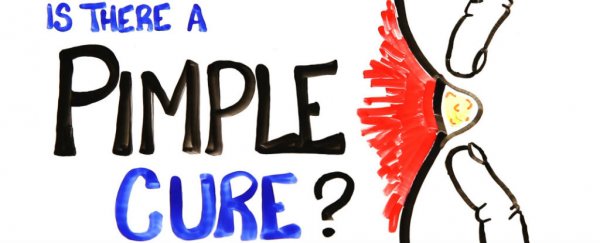
We've all been there - it could be your first day at a new school, a job interview, or yep, even your wedding day, but that one pimple right in the middle of your face always seems to appear at the absolute worst moment, whether you're an oily teenager or not. Unless you're very, very lucky, pimples are a part of life for most of us, and you'd be hard-pressed to find somebody with a miracle cure. So why do we get pimples, and how can we stop them?
As AsapSCIENCE explains above, it all comes down to our pores - those tiny hair follicles that cover just about every inch of our body and contain an oily substance called sebum. Sebum is regularly secreted by our pores to keep our body hair moisturised. So far so good.
But if that hair follicle get clogged up with dead skin cells and oils, a blockage occurs, and that sebum will keep flowing with no where to go. And to make matters worse, that's when bacteria come into play.
It sounds super gross, but once a blockage occurs, all that dead skin and extra sebum attracts the harmful bacteria that feed on it, and this can lead to an infection. Our immune system does its job by sending blood to the area to fight the infection, but this just makes everything look puffy and red.
When the white blood cells that have come to fight the infection die off, they get mixed up with whatever the dead skin cells and excess sebum were left by the bacteria and create the very attractive head of the puss-filled pimple. (I hope you're not eating right now.)
Depending on where the blockage occurred, you can end up with a whitehead (blockage occurs under the skin) or blackhead (blockage occurs above the skin). And despite what you might think, blackheads aren't made up of dirt - it's actually the result of melanin in the dead skin cells reacting with oxygen in the atmosphere… but knowing that doesn't make them any nicer to look at.
While they're more frequent in teenagers thanks to all those crazy hormones, pimples can occur at any age, and have been linked to the stress hormone cortisol. As the boys from AsapSCIENCE explain, cortisol increases the amount of inflammation in your body, which gives rise to those little red bumps. And stress lowers your immune system, which means your body can't fight the bacteria that will lead to infections and therefore pimples.
Sigh, life is so unfair.
So what can we do to fight this ugly mess? One step you can take in the 'war against pimples' is keeping your skin clean to reduce the risk of pore blockages, which includes daily cleansing and occasional exfoliating. But even the cleanest person in the world can still have a pimple problem. As the video above explains, your genetics and hormones play a far bigger role in whether or not you get pimples than cleanliness does.
What makes a cure so difficult to achieve is that pimples are caused by a whole range of factors - dead skin cells, excess sebum, bacteria, hormones - and there are plenty of treatments that address each of these factors individually, but many of them come with some terrible side effects.
The good news is there's hope - new and much more effective acne treatments could be on the horizon, based on what we're discovering about our skin's microbiota, or bacteria colonies. I'll let AsapSCIENCE explain in the video above while we all just cross our fingers and hope it happens soon.
